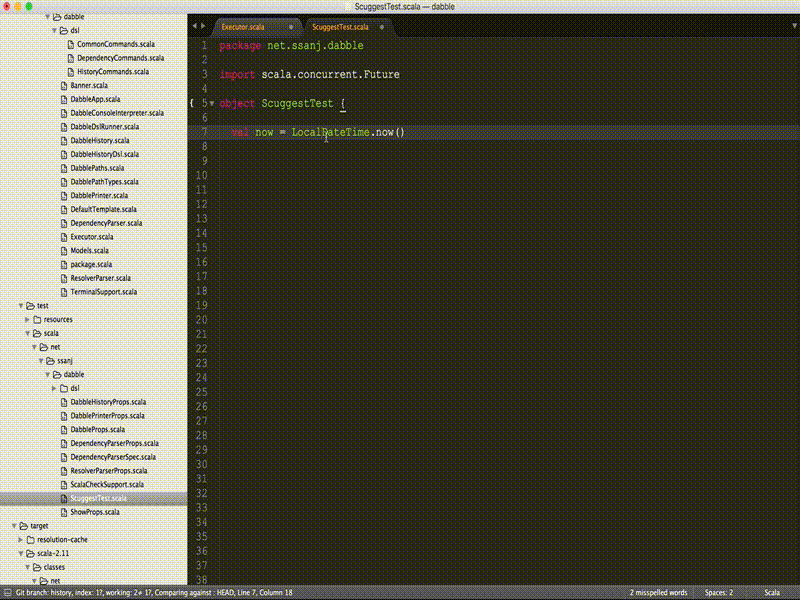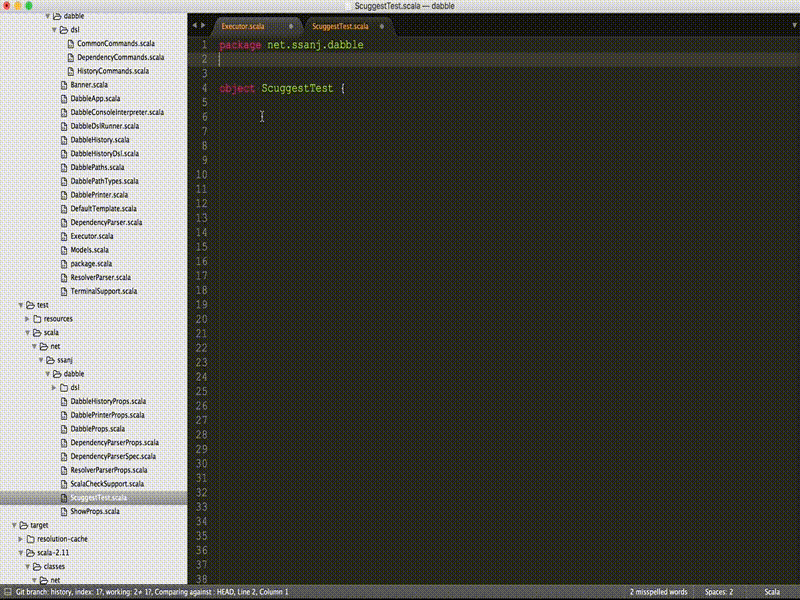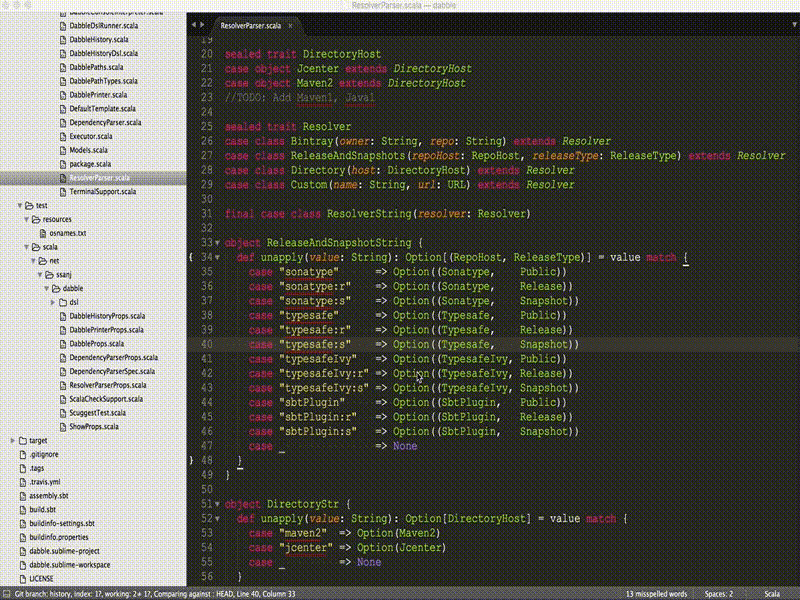Scuggest
A Sublime Text Plugin for Minimal Scala Imports
Details
Installs
- Total 588
- Win 459
- Mac 50
- Linux 79
| Feb 16 | Feb 15 | Feb 14 | Feb 13 | Feb 12 | Feb 11 | Feb 10 | Feb 9 | Feb 8 | Feb 7 | Feb 6 | Feb 5 | Feb 4 | Feb 3 | Feb 2 | Feb 1 | Jan 31 | Jan 30 | Jan 29 | Jan 28 | Jan 27 | Jan 26 | Jan 25 | Jan 24 | Jan 23 | Jan 22 | Jan 21 | Jan 20 | Jan 19 | Jan 18 | Jan 17 | Jan 16 | Jan 15 | Jan 14 | Jan 13 | Jan 12 | Jan 11 | Jan 10 | Jan 9 | Jan 8 | Jan 7 | Jan 6 | Jan 5 | Jan 4 | Jan 3 | |
|---|---|---|---|---|---|---|---|---|---|---|---|---|---|---|---|---|---|---|---|---|---|---|---|---|---|---|---|---|---|---|---|---|---|---|---|---|---|---|---|---|---|---|---|---|---|
| Windows | 0 | 0 | 0 | 0 | 0 | 0 | 0 | 0 | 0 | 0 | 0 | 0 | 0 | 0 | 0 | 0 | 0 | 0 | 0 | 0 | 0 | 1 | 0 | 0 | 0 | 0 | 0 | 0 | 0 | 0 | 0 | 0 | 0 | 0 | 0 | 0 | 0 | 0 | 0 | 0 | 0 | 0 | 0 | 0 | 0 |
| Mac | 0 | 0 | 0 | 0 | 0 | 0 | 0 | 0 | 0 | 0 | 0 | 0 | 0 | 0 | 0 | 0 | 0 | 0 | 0 | 0 | 0 | 0 | 0 | 0 | 0 | 0 | 0 | 0 | 0 | 0 | 0 | 0 | 0 | 0 | 0 | 0 | 0 | 0 | 0 | 0 | 0 | 0 | 0 | 0 | 0 |
| Linux | 0 | 0 | 0 | 0 | 0 | 0 | 0 | 0 | 0 | 0 | 0 | 0 | 0 | 0 | 0 | 0 | 0 | 0 | 0 | 0 | 0 | 0 | 0 | 0 | 0 | 0 | 0 | 0 | 0 | 0 | 0 | 0 | 0 | 0 | 0 | 0 | 0 | 0 | 0 | 0 | 0 | 0 | 0 | 0 | 0 |
Readme
- Source
- raw.githubusercontent.com
Scuggest
Scuggest (pronounced 'Suggest') is a Sublime Text plugin for automatically adding imports to your Scala files. It resolves the imports by scanning through a provided list of jars and class directories.
Scuggest was initially based on JavaImports but now works in a completely different way.
Installation
Here are a few ways to install Scuggest on your system.
Install it directly through Package Control.
Git clone the Scuggest repository into your Packages directory:
git clone git@github.com:ssanj/Scuggest.gitDownload the latest release source code and extract it to the Packages directory.
The Packages directory is located at:
- OS X: ~/Library/Application Support/Sublime Text 3/Packages
- Linux: ~/.config/sublime-text-3/Packages
- Windows: %APPDATA%\Sublime Text 3\Packages
Configuration
Using SBT
Run sbt-scuggest to generate all your basic configuration and update (or generate) your project file.
Manually
To use Scuggest, you need to have a project file (.sublime-project) created for your Scala project. You can do this for an existing project by clicking on the Project > Save Project As … menu item and saving the project to the root of your Scala project directory (usually where your build.sbt file lives).
Once you have a project created, use the settings element below and customise the scuggest_import_path and scuggest_filtered_path to suite your needs.
"settings": {
"scuggest_import_path":
[
"/Library/Java/JavaVirtualMachines/jdk1.8.0_65.jdk/Contents/Home/jre/lib/rt.jar",
"/Users/sanj/.ivy2/cache/org.scala-lang/scala-library/jars/scala-library-2.11.8.jar",
"/Volumes/Work/projects/code/scala/toy/dabble/target/scala-2.11/classes",
"/Users/sanj/.ivy2/cache/com.lihaoyi/ammonite-ops_2.11/jars/ammonite-ops_2.11-0.5.7.jar",
"/Users/sanj/.ivy2/cache/com.github.scopt/scopt_2.11/jars/scopt_2.11-3.4.0.jar",
"/Users/sanj/.ivy2/cache/org.scalaz/scalaz-core_2.11/jars/scalaz-core_2.11-7.2.2.jar"
],
"scuggest_filtered_path":
[
"com/sun",
"sun",
"javax/swing",
"org/omg",
"com/apple",
"java/awt"
]
}
scuggest_import_path lists the jar files you want Scuggest to look for classes in. This can include either Java or Scala jar files. Some typical jars to include are the Java rt.jar file and the scala-library-scala-version.jar file. You can add as many or as few libraries that you want searched here.
scuggest_filtered_path lists the path prefixes that are skipped when scanning for a target class. A typical example could be anything under the com/sun package. Notice that these are file paths as opposed to package (or dotted) paths.
Usage
You can use Scuggest in the following ways:
- Click on the name of a class that you want to import into your Scala source file and press CMD + ALT + I. This will select the word under the cursor and attempt to display any matched classes.

- If you press CMD + ALT + I on an empty line then a search box will be displayed allowing you to enter the class name or a wildcard to match on.

- If you press SHIFT+CMD + ALT + I anywhere, even within a selection, a search box will be displayed allowing you to enter the class name or a wildcard to match on.

Importing Source Classes
Scuggests works by inspecting jar files in your scuggest_import_path and class files in your target directory. This means that to for Scuggest to work with your source classes, they need to have been compiled. A recommended workflow is to use SBT with continuous compilation to ensure all sources are compiled and thus accessible by Scuggest:
sbt ~test:compile
Selection Matchers
Scuggest uses a variety of matching strategies to find the class you select.
1. Class name
This is the first matcher that is tried against a selection. It attempts to find classes that end with the search term supplied. NB A selection is converted to a search term. The actual matching is done against the search terms.
# example class: net.ssanj.dabble.ResolverParser
# search term: ResolverParser
# matched: true
# example class: net.ssanj.dabble.DabbleWorkPath
# search term: ResolverParser
# matched: false
# example class: net.ssanj.dabble.ResolverParser
# search term: ResolverPars
# matched: false
2. Object name
This is similar to the Class name matcher but only matches objects that end with the search term. Object class names end with a $.
# example: net.ssanj.dabble.DabblePathTypes$DabbleWorkPath$
# search term: DabbleWorkPath
# match: true
3. Object with subtype(s)
Matches a search term against an object that defines other types (classes, traits or other objects)
# example: net.ssanj.dabble.DabblePathTypes.DabbleWorkPath.NestedDabbleWorkPath.MoreNestedDabbleWorkPath
# search term: DabbleWorkPath
# matches:
# net.ssanj.dabble.DabblePathTypes.DabbleWorkPath
# net.ssanj.dabble.DabblePathTypes.DabbleWorkPath.NestedDabbleWorkPath
# net.ssanj.dabble.DabblePathTypes.DabbleWorkPath.NestedDabbleWorkPath.MoreNestedDabbleWorkPath
# net.ssanj.dabble.DabblePathTypes.DabbleWorkPath._
Wildcard Matches
These matchers are generally used through a search box.
1. By prefix
Matches a class name that starts with the given search term. The search term should end with an *.
# search term: Future*
# matches:
# java.util.concurrent.Future
# java.util.concurrent.FutureTask
# scala.concurrent.Future
# scala.concurrent.FutureTaskRunner
2. By suffix
Matches a class name that ends with the given search term. The search term should end with an *.
# search *DateTime
# matches:
# java.time.LocalDateTime
# java.time.OffsetDateTime
# java.time.ZonedDateTime
# java.time.chrono.ChroLocalDateTime
# java.time.chrono.ChroZonedDateTime
# java.util.Formatter.DateTime
3. Anywhere
Matches the supplied search term anywhere in the class name. The search term should begin and end with an *.
# search: *Work*
# matches:
# java.util.concurrent.ForkJoinWorkerThread
# java.util.concurrent.ForkJoinPool.WorkQueue
# java.util.concurrent.ForkJoinPool.InnocuousForkJoinWorkerThreadFactory
# java.util.concurrent.ForkJoinPool.ForkJoinWorkerThreadFactory
# java.util.concurrent.ForkJoinPool.DefaultForkJoinWorkerThreadFactory
Caching
Scuggest tries to cache your files in the most non-intrusive way possible. The contents of any jar files specified in the scuggest_import_path is cached until the scuggest_import_path is modified by adding, deleting or modifying a jar path. Directory paths specified in scuggest_import_path are always read each time in order to index any new files that could be added.
You can display the cache by running the “Scuggest: Show Cache” command from the command palette (CMD + P). This outputs the project location along with the number of classes cached for that project to the console (CTRL + ).
Scuggest cache:
/Volumes/Work/projects/code/scala/toy/dabble/dabble.sublime-project : 9992
You can also clear the full cache for all projects by running the “Scuggest: Clear Cache” command from the command palette. This will mean that the cache will have to be recreated on the next import call.

